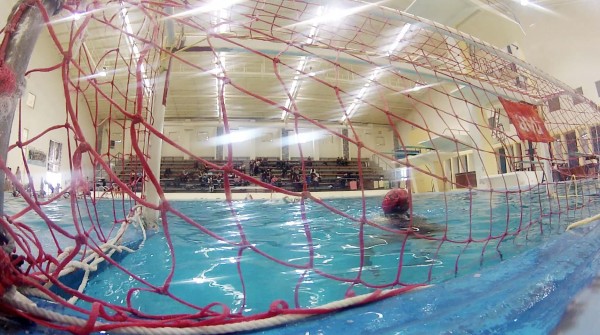CD.JUAREZ — An unusually cold and rainy morning here welcomed the public to a training session at the diving pool of Centro Acuatico Universitario of the University of Juarez that is usually closed to outsiders. Yellow balls float in the water, and two goals are set up at the edges of the pool.
What was once one of the best diving facilities in Mexico, the diving pool that is still equipped with trampolines and platforms and has a depth of more than 50 feet has been repurposed to fit teams of aquatic warriors that play a sport unknown to many: Water polo.
A sport conceived in England and Scotland, water polo still enjoys wide popularity in Europe,the United Stated, Canada, China and Australia. Now Mexico joins the list as the popularity of this water sport grows here.
“When people asked me what is water polo, I would tell them that this is like soccer in the water, or hand ball in the water,” said Hugo Hinestroza, 20, a water polo veteran who played with the Juarez team since its inception10 years ago. And he now comes back as often as he can to continue to support the younger players.

Juarez water polo. Photo by Genaro Cruz Martinez, Borderzine.com
The water polo team in Juarez started in 2005, as a project that attracted the participation of only a dozen young men, all of them from the swimming team, under the guidance of coach Guillermo Aguirre. Nobody had any idea of how to play the sport, but they learned as they went along.
Fernando Chacon was part of that first generation of players. “We had no gear, no training back then. We only got better as we started competing and we asked for advice from other competing states.”
He says that the level the team had increased as new coaches started working with the team.
“When coach Messir from Cuba started working with us in 2009, the discipline and hard work he injected into the team started paying off. But still at that point we had never gotten a medal in any competitions.”
As the team got better with the fundamentals taught by Coach Aguirre and Coach Messir, the popularity of the team within the city started growing. More and more kids from young age to teenagers started joining the team. In addition an all-female category was added. A pool that used to be almost empty was at that time at full-capacity.
When coach Messir was about to leave the team, a group of parents started working hard to find a replacement for the Cuban coach. The search stopped when they found coach Hodigis Darko, a former waterpolo player from Serbia, a country where waterpolo is the national sport.
“This has been a very good experience, something new for me. I first rejected the offer when I learned about Juarez. But the second time, I accepted and I don’t regret it,” said Darko.
He also says that when he got here, he found a team that had potential but there was no clear system. He tried to separate the team into groups and levels, because everyone was always training together.
“Now we have a system and I’m trying to implement the European style of water polo, but it is hard because the Mexican style is very different.”
Under the command of Darko the team won a gold medal last year in a national competition and the performance of some of the players was so noteworthy that in March, 2014 three players were called to train for the national team at the Centro de Alto Rendimiento in Mexico D.F., the sports facility where only the finest national athletes train. The team was formed to represent Mexico at an international competition in Cuba.
Juan Pablo Puentes was among those athletes and he says that it was a dream coming true.
“It was a great experience to represent my country. We learned a lot from other trainers, other players and it was great to learn about the Cuban style of the game, which is really rough.”
Even though this great accomplishment was reached, he says that they have to keep working hard so more of the players can have the same opportunity he had.
All of the players agree that playing this sport taught them discipline and the importance of maintaining a routine that includes physical activity as part of a team. The camaraderie still exists and, even though most of the first generation isn’t playing any more, they remain good friends.
“Nothing compares to the unity and friendship that generates in water polo. When you stop seing a friend and you meet again, playing brings back all the memories,” said Hinestroza.
